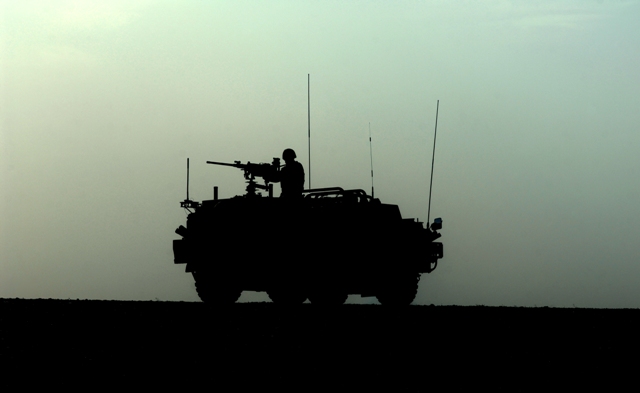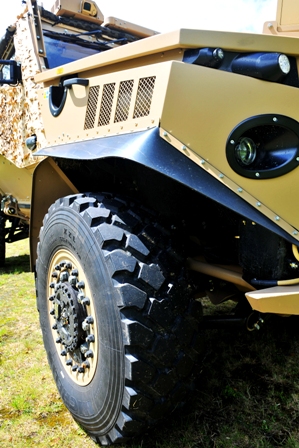 The Defence Support Group has a long history of supporting the British Army’s equipment and vehicle fleets. From small arms to main battle tanks, DSG provides a comprehensive support service that delivers fleet management, depth repair and upgrade of the Army’s equipment both in the UK and on the front line in Afghanistan. Here, MOD DCB looks in depth at the Group’s current operations.
The Defence Support Group has a long history of supporting the British Army’s equipment and vehicle fleets. From small arms to main battle tanks, DSG provides a comprehensive support service that delivers fleet management, depth repair and upgrade of the Army’s equipment both in the UK and on the front line in Afghanistan. Here, MOD DCB looks in depth at the Group’s current operations.
The Defence Support Group (DSG) operates from sites across the UK, many of which it shares with the Army. It works hand in hand with Army units, delivering day-to-day support to the field, as well as major overhaul and upgrade programmes for the Ministry of Defence’s Defence Equipment & Support (DE&S) teams. Since 2009, DSG has also provided support at the front line of Army operations, regenerating equipment at Camp Bastion in support of Operation Herrick in Afghanistan. DSG supports the majority of the Army’s tracked (A vehicle) and wheeled (B vehicle) fleets as well as the current range of Protected Mobility vehicles, such as Mastiff, Jackal and Foxhound.
The British Army traditionally categorises the maintenance and repair of its equipment in four levels. Level 1 covers servicing and day-to-day preparation. Level 2 covers maintenance by replacement, adjustment or minor repair including fault diagnosis and minor authorised modifications, within specified times, using generally provisioned resources. Level 3 covers maintenance in greater depth such as repair, partial reconditioning and modification requiring special skills or special equipment. Finally, Level 4 covers full reconditioning, major conversions or base overhauls and is commonly referred to as depth repair.
Historically, the Army delivered level 1 and 2 forward repair while civilian workshops delivered level 3 and 4 depth repair. This has helped ensure the Army retains the competence and technical skills required to support equipment in an operational environment. However, over recent years delivery has been blurred due to the increasing operational demands placed on the Army, and particularly on the Corps of Royal Electrical and Mechanical Engineers (REME).
DSG then stepped up to deliver level 2 and in some cases level 1 support in the UK. The close relationship between DSG and REME makes this almost seamless and is helping shape the future equipment support environment, where DSG may provide increased support to the Army as part of the Total Support Force concept, a product of the Army 2020 project developed in the light of the Strategic Defence and Security Review.
 DSG uses a network of workshops in the UK to reset, repair and regenerate battle-damaged or operationally time-expired vehicles. These workshops include a dedicated cryptographic facility with Top Secret classification for the repair of secure electronics, a test facility for all military automotive engines and transmissions, and a custom-built electromagnetic compatibility chamber capable of housing the majority of military vehicles including main battle tanks.
DSG uses a network of workshops in the UK to reset, repair and regenerate battle-damaged or operationally time-expired vehicles. These workshops include a dedicated cryptographic facility with Top Secret classification for the repair of secure electronics, a test facility for all military automotive engines and transmissions, and a custom-built electromagnetic compatibility chamber capable of housing the majority of military vehicles including main battle tanks.
Over the years, to enable military resources to concentrate on operational commitments and training, DSG has extended this expertise to support training and operations overseas including Canada, Germany and Iraq (Operation Telic). However, its most notable role is extending its expertise by operating the purpose-built Equipment Sustainability System (ESS) Regeneration Capability (RC) workshop in Camp Bastion.
The tens of thousands of equipments deployed to support UK Forces in Afghanistan is only sustainable in the long term with an appropriate equipment support regime in place that extends to deep repair and maintenance. Now a team of just over 110 DSG volunteers are at the forefront of synchronising level 2 and 3 maintenance across all platforms and lines of communication, and in some cases level 4 maintenance on electro optics. This in-theatre support ensures optimum availability and vehicle survivability, saving the lives of British Servicemen and women while delivering cost avoidance savings of over £90 million to the MOD.
Following an amendment to the ESS contract, DSG has assumed the additional role and responsibility for operating the Equipment Redeployment Hub Forward (ERHF) based at Camp Bastion. The role of the ERHF is to act as the central hub and receipt point for Vehicles and Main Equipment (VAME), and manage all those assets identified for redeployment back to the UK. As the ERHF provider, DSG takes ownership of the platforms, vehicle installation kit and complete equipment schedules and ensures compliance with MOD accounting policy and Proof of Good Order (POGO) requirements.
DSG has now received a further contract from Army Headquarters to manage the Herrick Exchange Point (HXP) in Warminster.
DSG provides depth repair to the Army’s A vehicle fleets where it works closely with the original equipment manufacturers (OEMs) such as BAE Systems, but it is the Urgent Operational Requirement (UOR) vehicles brought from Afghanistan that will dominate the Army’s current and future fleets. This shift from tracked armour to protected mobility has also seen a change in the support environment with a new breed of OEMs such as NP, Force Protection and Supacat.
The major thrust of DSG’s future strategy is its aspiration to develop as a fleet manager. It is already proving its merit in this role in the partnering concepts developed with Army HQ, supporting the Operational Training Equipment Pack and the Reinforcing fleet. The Reinforcing fleet aims to provide the Field Army with collective training in the right place, at the right time and in the right configuration.
The UK training fleet remains under the ownership of the MOD, with DSG acting as the fleet custodian, responsible for receipt, rectification, repair, maintenance, storage, integration and issue of platforms and platform systems including weapons and communications. DSG’s pivotal role is to ensure that the fleet is as free of scheduled maintenance as possible. There is now a progressive increase in the availability of vehicles leading to a reduction in the number of lost training days. The evidence-based success of this partnered approach highlights the potential for developing a fleet management service across the Army’s fleets.
DSG’s mission has recently been revised with a subtle but very important change to reflect its future strategic direction. Its new mission is to be a ‘trusted partner’ – a term coined by the Chief of the General Staff to reflect the vital relationship between DSG and the UK Armed Forces. It also reinforces DSG’s ability to provide a range of services to help the MOD deliver its outputs through support to training, contingency and operations both in the UK and overseas.
